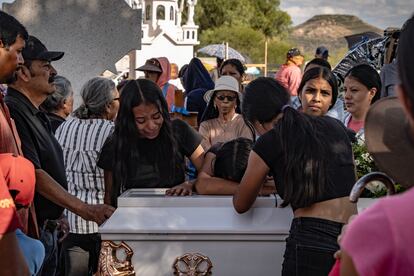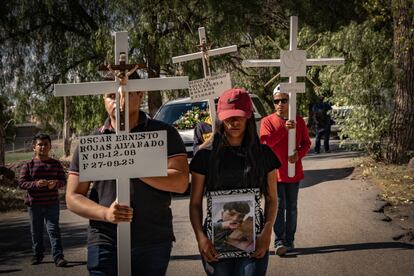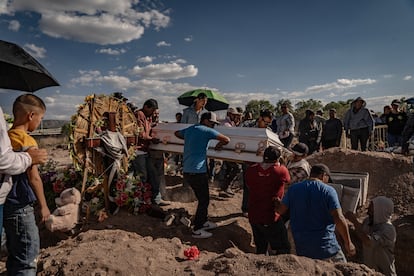In Zacatecas, there is no peace, even in the cemetery: the murderers are also here
The families of the six teenagers who were murdered in the Mexican town of Malpaso have buried their dead. They are filled with rage, but they are also fearful, due to the presence of informants from organized crime at the funerals


Here, even at the funeral, the murderers are present. The criminals who killed Óscar Ernesto, Diego, Jorge Alberto, Héctor Alejandro, Gumaro and Jesús Manuel. The men who abandoned their tortured bodies on a mountain in the Mexican state of Zacatecas. They are here, in the Malpaso cemetery, camouflaged among distraught mothers and families destroyed by loss. The “bad guys” are here: the armed men, the cartels, the drug traffickers. They are here to send a clear message: that they are the law. They are the invisible hand that dictates, suffocates, terrifies, executes. Their twisted logic tells them that there’s no peace for the victims, even on the day of their burial. It doesn’t matter if those killed were 18, 17, 16, 15 and 14-years-old — it doesn’t matter that they were only boys.
The community of Malpaso cries out with anger. Still, the residents are fearful, due to the presence of “hawks” — informants sent by the criminal organizations. These spies are a reminder that words can be dangerous… Everyone is listening. The cartels have sent their hawks — disguised as ordinary mourners — to monitor and take note of those who talk too much. This past Thursday, they hung around the teenagers’ coffins, saying that it’s not fair, that the kids didn’t get into trouble, they never hurt anyone.
Tears mix with sweat in the cemetery. Women hold umbrellas to protect themselves from a violent sun that burns their skin. The dust sticks to the mourners’ clothes, while the gravediggers remove the earth that will soon cover 17-year-old Diego Rodríguez Vidales. The crowd surrounds his mother, who, defeated, throws herself over the coffin, sobbing out broken and incomprehensible words. A young woman — perhaps Diego’s sister — faints. The grandmother howls again and again: “Oh, my little Dieguito!” The television cameras record an orchestra that sings religious songs, although even the music fails to drown out the hoarse cries and low moans. The same scene will be repeated minutes later, at the grave of 15-year-old Óscar Ernesto Rojas Alvarado. Even if the trumpets don’t play sad ballads, the music sounds devastating.

There’s a nervous-looking man in a corner of the cemetery. He’s a relative of one of the murdered boys. He constantly looks to each side and asks reporters to put away their cameras and notebooks. He only agrees to speak with EL PAÍS if his name doesn’t appear — the same condition made by almost all other interviewees. The fear in the air is palpable, sticking to the skin as easily as the dust or sun.
“Malpaso is a war zone,” he laments. “When night falls, there’s an order not to leave your home — there are no police.” He explains that, here, the government consists of the Jalisco New Generation Cartel (CJNG), which is waging an eternal war with the Sinaloa Cartel for control of the state, a key artery in drug-trafficking to the United States.
Today, the cartels are nervous. There’s too much exposure, too many people. “If so much press [hadn’t come to the funeral], they would have carried out a massacre. After this, comes hell.”
This past Sunday, early in the morning, a group of armed men broke into a ranch in Malpaso and kidnapped seven teenagers. They sent videos to their families, in which the young people are seen being marched, barefoot, through the mountains. Six of them were ultimately murdered, their bodies dumped on a hill near La Soledad — a community just three miles from the place where they were kidnapped. Only one of the teens survived, Sergio Yobani Acevedo Rodríguez, 18, who was admitted to a hospital for head injuries. One of his relatives — also on the condition of anonymity — assures EL PAÍS that the boy doesn’t remember what happened. “He has after-effects, he wakes up saying: ‘Don’t hit me anymore, I haven’t done anything wrong.’ There are no words to explain to you the condition they found him in.”
The rest of the teenagers were held in wake this past Thursday in different parts of Zacatecas. The funerals of Óscar Ernesto and Diego have been the most crowded; the others have been held in private. The residents of Malpaso have come in trickles, until they fill a municipal hall that’s serving as a chapel. The two coffins rest in the middle, with framed photos of the boys, surrounded by candles and wreaths of flowers.

Their stories — even before the kidnapping — were marked by violence and poverty. Óscar Ernesto’s father murdered his mother. The boy found her when she was still alive, with a knife in her neck. He was only 12-years-old. “Imagine seeing your mother in a pool of blood. It was suffering for him, he was damaged, he needed help and he didn’t get it. He didn’t deserve to die like this, he didn’t mess with anyone, they shouldn’t have killed him like that, he suffered so much since he lost his mother,” his aunt cries. María de la Luz Caldera and other family members had been caring for the teenager since his mother was murdered.
“He wasn’t aggressive, he just hung out with his friends. These armed people arrived and took them away barefoot, they sent us videos to show us how they tortured them. We want security here in Malpaso. If he had been the son of the governor or the president, they would have even sent drones [to look for him],” the woman adds. “[The cartels] come here very often. They’ve taken so many little boys who have never been heard from again. We’re already afraid — after a certain hour, everyone locks themselves in. We cannot go outside because they’re here.”
Another relative tells similar horror stories: how, in recent months, the disappearances of young people in the community have multiplied. “Usually one [youth is kidnapped] at a time. There have never been so many abducted at once.” He has no doubt that “the one they left alive (Sergio Yobani) was meant to pass along the message.” The kidnappers wanted him to tell everyone what they did to his friends, so that the rest of the town would know what kind of brutality the cartels are capable of. Surviving, the relative sighs, is a matter of luck. Life in Malpaso is very similar to a chronic illness.
During the funeral hours, only one police patrol passes by, despite the fact that the government has announced a large security deployment. Silence reigns in the room. Suddenly, a woman’s voice begins to sing a religious song, which has a somewhat comforting effect on the collective mood.
The heat increases. The stray dogs and the flies arrive. At 2:30 p.m., men load the coffins into two hearses. The band plays the first song, the cameras roll. A mother shouts, her face swollen: “They’re recording this now, but before, not one of our boys was worth anything, not one!” The procession moves towards the church, where a mass is celebrated in honor of the young people. The soldiers are only seen at the end, guarding the entrance to the cemetery. It doesn’t matter much — it’s not like anyone was expecting them.
Tomorrow, the press will be gone too. Malpaso will, once again, be left alone with the executioners and the dead.
Sign up for our weekly newsletter to get more English-language news coverage from EL PAÍS USA Edition
Tu suscripción se está usando en otro dispositivo
¿Quieres añadir otro usuario a tu suscripción?
Si continúas leyendo en este dispositivo, no se podrá leer en el otro.
FlechaTu suscripción se está usando en otro dispositivo y solo puedes acceder a EL PAÍS desde un dispositivo a la vez.
Si quieres compartir tu cuenta, cambia tu suscripción a la modalidad Premium, así podrás añadir otro usuario. Cada uno accederá con su propia cuenta de email, lo que os permitirá personalizar vuestra experiencia en EL PAÍS.
¿Tienes una suscripción de empresa? Accede aquí para contratar más cuentas.
En el caso de no saber quién está usando tu cuenta, te recomendamos cambiar tu contraseña aquí.
Si decides continuar compartiendo tu cuenta, este mensaje se mostrará en tu dispositivo y en el de la otra persona que está usando tu cuenta de forma indefinida, afectando a tu experiencia de lectura. Puedes consultar aquí los términos y condiciones de la suscripción digital.








































